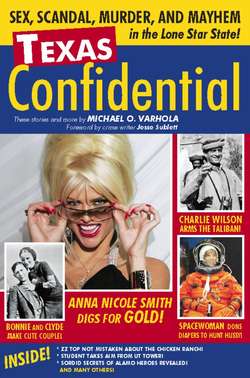Читать книгу Texas Confidential - Michael Varhola - Страница 8
На сайте Литреса книга снята с продажи.
Preface
ОглавлениеTO SAY THAT AUTHORING TEXAS Confidential was a very personal experience would be something of an understatement. In the year leading up to the publication of this volume, I read dozens of books and hundreds of articles related to the subjects of sex, scandal, murder, and mayhem in Texas and travelled from one end of the state to the other visiting the sites associated with many of the chapters that follow. A number of things, however, ended up making this project especially relevant and interesting to me on a personal level.
These have included covering the murder trial of Janice Marie Vickers; being menaced and stalked by her husband; interviewing her attorney, Mark Clark, who warrants his own sordid chapter; socializing with one of the Enron executives convicted of fraud; and reporting on a local chupacabra sighting.
Two of the chapters also draw upon research I undertook several years before this book had even been conceived. One of these involved discovering in 2001 that a girl I had gone to school with had been convicted of murder and been sentenced to many years in the Texas prison system. The other involved author Robert E. Howard, to whose home and gravesite I made a pilgrimage in early 2003.
Going beyond the specific contents of this book, I have had a number of interesting encounters since moving to Texas in 2009 either tangential to the material I have included in it or, at least, evocative of it. These include interviewing a caterer who ended up being charged with more than a hundred counts of child pornography; having lunch and several rounds of drinks bought for me and another reporter by an attorney reputed to be a mouthpiece for the Mexican Mafia; being “profiled” by an almost open sociopath who presents himself as a federal agent, which he may or may not actually be; and being acquainted with someone involved in an apparent Medicaid scam.
Working as the news reporter and editor—the Hilltop Reporter in Comal County also affected my attitudes toward iniquity in the Lone Star State. I was verifiably lied to by at least some members of every single local board I covered, especially those associated with fire departments. Having the newspaper I helped run fold after just two years largely because of a lack of community support certainly did nothing to diminish the cynicism that seems to be an inevitable result of working as journalist.
There is a widespread perception, both in and outside of Texas, that the state’s justice system is particularly severe, something that a little observation will reveal is only partially the case. It is true that a disproportionate number of black men have been given harsh sentences or put to death, and that a number of them have subsequently been proven innocent of the crimes for which they were convicted. Texas also has a history of coming down hard on drug offenses, and it is certainly true that much of the state’s prison system is particularly grim.
Overall, however, the system is strikingly lenient toward violent crimes, especially those perpetrated by whites. Historically, it has set free an amazing number of criminals, often as a result of administrative issues like prison overcrowding, caused in part by over-incarceration for nonviolent crimes. Some of the state’s most heinous criminals have not only gotten relatively light sentences, they have been released while they were still young enough to effectively continue their depredations.
Serial killer Kenneth Allen McDuff, for example, was given three death sentences but was released after just a little more than two decades in prison—and subsequently killed at least another eleven people. He was part of a broader wave of clemency that led to the release of a stunning 60,000 “low-risk” offenders and 127 convicted murderers, 20 of them former death row inmates. And confessed killer Janice Marie Vickers, whose murder trial I covered in 2009, received just seventeen years for what is generally known as First-Degree Murder—and simply Murder in Texas—meaning she will probably serve less than five years in prison for deliberately running over an old lady’s head multiple times with a car.
So, to say that I have been personally moved by my involvement with this book would certainly be true. And, if I have done my job well, then you will also be moved by some of the stories in this book and find them to be as fascinating as I do!
Michael O. Varhola
Canyon Lake, Texas
May 2011
